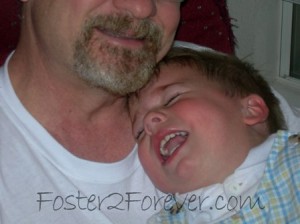Last week on 20/20, Diane Sawyer reported on medicating foster children.
Their report stated that foster kids are more than 13 times more likely to be prescribed psychotropic medications than the general population.
Psychotropic medications are scary to me, especially when young children are involved. In the story, the doctor in question sees a child for about 5 minutes before prescribing a mind-altering medication. How can a doctor really know what’s going on with a child in a short visit?
Effect of Anti-Depressants on a Child
At the age of 9, a close relative had to be hospitalized after a psychiatrist prescribed this child an anti-depressant — because he had been depressed for getting in trouble at church the night before. To say the Selective Serotonin Re-uptake Inhibitors (SSRIs) – a class of antidepressant – caused severe side effects would be an understatement. This child lost bladder control, eye movement, and basically went manic when he was medicated with an SSRI. Before that, he was simply hyperactive.
She then diagnosed him as bi-polar. What? That kid was not bi-polar! He went manic when medicated and simply pouted when he didn’t get his way. It took months to get the child stable again.
Would you believe, only 3 years later, this same psychiatrist again prescribed him an anti-depressant? — because he was feeling down after a parent moved out of town. He had spoken with this psychiatrist for 5 minutes where she basically told him if he didn’t take the anti-depressants, he would have to go back into the hospital. As she handed over the SSRI drug sample, I heard her say: “Now watch him closely because we don’t want him to go manic again.“
I wanted to say: “Quack, are you the one that’s nuts?“
Personal Experience with Anti-Depressants
My personal experience with psychotropic medications make me wary. Nearly 10 years ago, after losing a loved one, I was prescribed the anti-depressant, Lexapro. I didn’t sleep for 2 days and then became panicked when I had the dry heaves after attempting to eat. At the hospital, the nurse was very familiar with my symptoms from Lexapro. My anxiety doesn’t mix well with an SSRI like that.
A few years later, after discovering our infertility, my Ob-Gyn attempted to prescribe an anti-depressant for me; however, she gave me a blank look when I told her that I don’t handle SSRIs very well. She shouldn’t be prescribing psychotropic medicine that quickly anyway – she was the wrong type of doctor for that!
Then, when a psychiatrist prescribed a cyclic anti-depressant for me, I slept. When I called about the side effect, he increased my dosage. I didn’t wake up for 2 days! I made the choice to deal with my depression actively instead of with medication. By exercising and focusing on other things, I am the happiest ever!
Medicating Our Traumatized Child
Needless to say, our decision to allow a psychiatrist to prescribe medication for our Stinkpot’s hyperactivity was difficult for us. We were pleased that the doctor first opted for a more conservative alternative before prescribing stronger Ritalin or Adderall. However, I did cry as my Stinkpot adjusted. He did well for nearly a year.
He is now on a psychotropic medication to control his rages, and I watch him intently, constantly looking for side effects or problems. So far, his behavior is remarkably improved. Before, it would take him 45 minutes to cycle through his rages. Now his rages last between 2-3 minutes.
Our prayer is that as he matures and learns more self-control, he won’t need meds to help control his rages. We are also examining other avenues, such as play therapy, bonding, and allergies.
We have been fortunate in that he has been our only child prescribed psychotropic medications.





